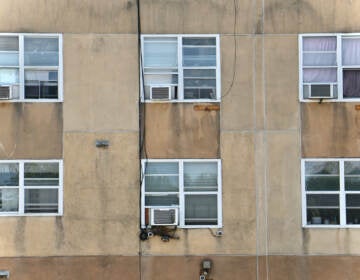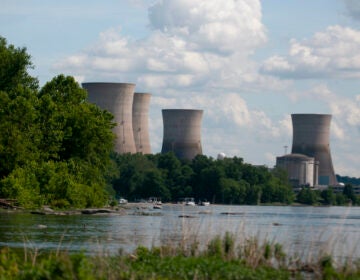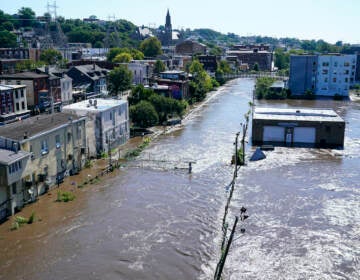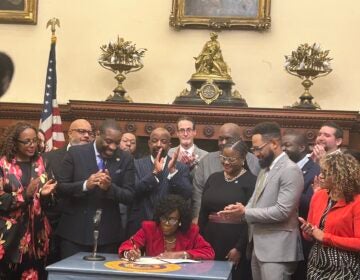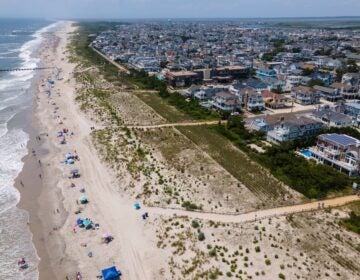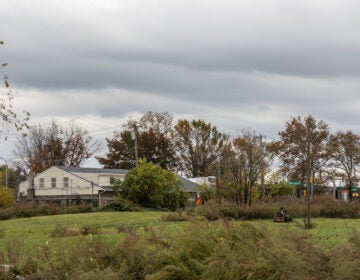A flurry of grant money is flowing to the Philly region for environmental projects
Grants for solar panels, turning tree waste into lumber and cleaning up litter are coming to the region. Some advocates say more is needed.
Listen 1:22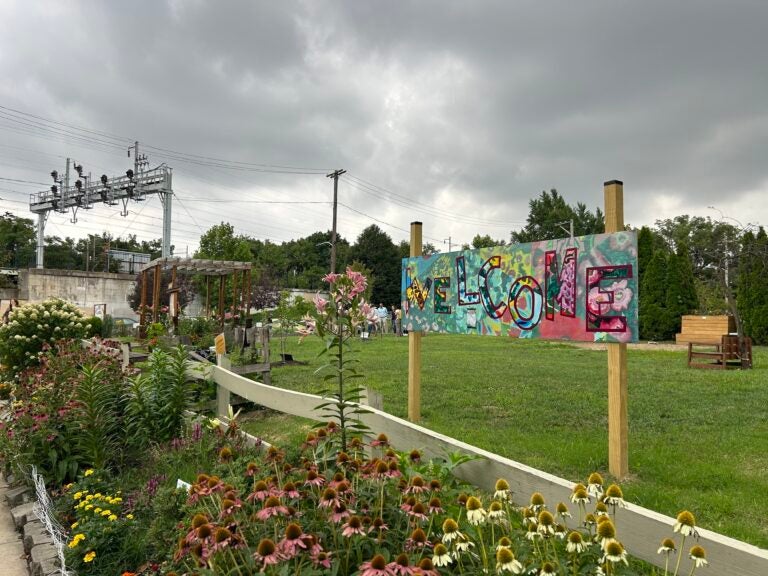
EPA officials visited Tioga-Hope Park and Garden in North Philadelphia Wednesday to learn about the community's environmental priorities. (Sophia Schmidt/WHYY)
Have a question about Philly’s neighborhoods or the systems that shape them? PlanPhilly reporters want to hear from you! Ask us a question or send us a story idea you think we should cover.
A surge of federal money for environmental justice and climate action is flowing to the Philadelphia region.
This week, the EPA announced funding coming for upcycling tree waste into wood products in Philadelphia and Pittsburgh and for reducing planet-warming pollution from Pennsylvania’s top climate-polluting sector. In the coming month, small community-based organizations in the Philly region can start applying for grants for environmental justice projects.
“There’s never been a moment that comes close to both the money… and the opportunity of the moment,” said Ruth Ann Norton, CEO of the Baltimore-based nonprofit Green & Healthy Homes Initiative, which is distributing pass-through grants to smaller organizations in EPA’s Region 3.
The money comes from the Inflation Reduction Act, the biggest federal investment in clean energy in U.S. history.
Former President Donald Trump has said he wants to see parts of the law repealed, and federal agencies are reportedly rushing to distribute climate funds before the end of Biden’s term.
“It’s a political world. Lots could happen,” Norton said. “We’re gonna make it hard for anyone to ever think about wanting to take money back that is actually delivering health, value and real opportunity for residents across this country.”
Meanwhile, community-based organizations in the Philly region are working to make their communities greener and healthier — and seeking more funding to expand their efforts.
“We have ideas and we have a lot of people who want to get involved, but we can’t involve them because we can’t pay them,” said Ahmir Harris, Neighborhood Advisory Committee coordinator at Tioga United, a nonprofit that runs a same-day pay cleanup program in the Nicetown-Tioga area.
Workforce development and ‘upcycling’ tree waste
PowerCorpsPHL and the Pittsburgh Conservation Corps together received a nearly $14 million grant from the EPA to create the infrastructure and workforce development needed to upcycle tree waste in the two cities to create commercial wood products.
“[We’ll be] working across the state to keep urban wood waste out of landfills, produce lumber and biochar to clean soil, and create job training and employment opportunities,” PowerCorpsPHL director Julia Hillengas wrote on LinkedIn.
PowerCorpsPHL is also running an urban forestry fellowship program through the American Climate Corps, a program the Biden administration created through executive action last year.
Cutting industrial pollution
The industrial sector is Pennsylvania’s biggest source of planet-warming pollution.
A $396 million EPA grant announced this week will allow the state to create a grant program to help industrial facilities reduce their fossil fuel pollution, which scientists say drives climate change. The program could cut Pennsylvania’s annual climate pollution from industrial sources 10% by 2050, according to state officials.
Facilities could use the money to install electric heat-pumps, insulation, rooftop solar panels or geothermal systems. They could also use it to replace diesel-powered generators with equipment that runs on electricity, capture planet-warming gasses from coal mining operations or install carbon capture systems.
The state will prioritize projects that use union labor or are located in environmental justice communities, which the state defines using factors such as asthma rates, proximity to oil and gas wells, income and race, said Jessica Shirley, the acting secretary for the Pennsylvania Department of Environmental Protection.
The projects will not only cut the pollution contributing to global climate change, but they have the potential to create jobs and reduce pollution that causes asthma attacks and other health problems locally, Shirley said.
“We’ll be cleaning up Pennsylvania’s air quality through this grant program,” she said.
Money available for smaller environmental projects
Illegal dumping cleanups, air quality monitoring near industrial facilities, efforts to get lead and asbestos out of homes and other small-scale environmental justice projects in the Philly region could get a boost from a grant opportunity opening in August.
The Thriving Communities grants, distributed for the EPA by the Green & Healthy Homes Initiative, are open to community-based nonprofits in underserved and disadvantaged communities of Pennsylvania and Delaware. Over 170 grants of between $75,000 and $350,000 will be available.
Other eligible activities include environmental justice training for teens, stormwater management projects that reduce flooding and renovations that make homes more energy efficient. The money can be used for staffing, communications or supplies.
The goal is to build capacity at small nonprofits so they can access even more grant money and grow their solutions, Norton said.
“Whether it’s building their board, helping them build their financial infrastructure, … access other dollars,” she said. “It’s catalytic money.”
A desire for more funding
During a visit to the Nicetown-Tioga neighborhood in North Philadelphia Wednesday, EPA officials learned about the local solutions organizations are working on and heard calls for more resources.
Officials met with neighborhood residents and nonprofit staffers working to plant trees, secure ownership of community garden land, clean up trash and manage stormwater. Nicetown-Tioga was chosen for the EPA listening tour because of its air quality concerns from traffic and industry, old brownfield sites and history of disinvestment, officials said.
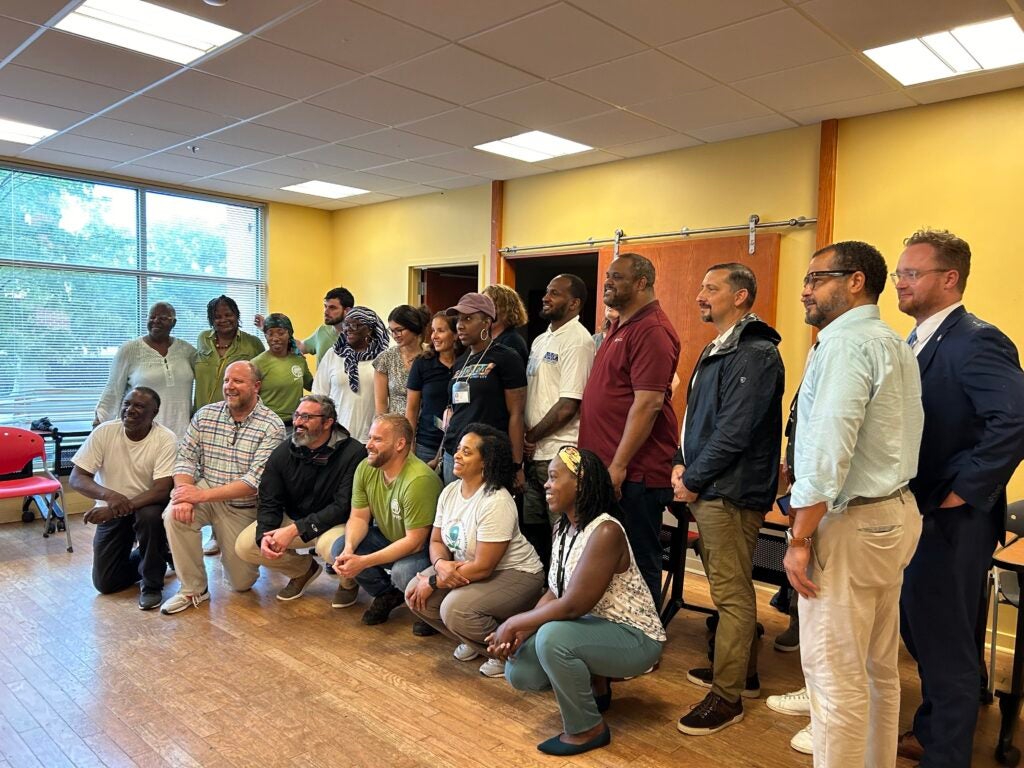
Harris, with Tioga United, described the organization’s land care efforts, cleanups and work to involve teens participating in a paid violence prevention program in environmental efforts.
“The more funding we have, the more we could do,” he said.
Matt Rader, president of the Pennsylvania Horticultural Society, said the organization is currently seeking additional funding from the EPA to plant trees in South, West and North Philly. He also said the agency should fund community organizing to bring together disparate efforts to improve the environment in neighborhoods.
“There’s not government support for that today,” he said.
Carolyn Booker, a gardener at Tioga-Hope Park and Garden, said the group’s central struggle has been obtaining ownership of the land they steward, so they can make long-term investments.
“What we’ve been trying to do is institute different programs that’ll be there long-term so that we can leave a legacy of education — as well as beauty — for other generations to come,” she said. “If there’s any way EPA can give us more support, … we can breathe a little bit more easier.”
EPA Regional Administrator Adam Ortiz said the goal of the visit was learning what support is needed.
“As a big federal agency we can’t always be as nimble, we don’t have the wisdom that folks have here in their community,” Ortiz said. “They see the challenges firsthand, so we want to make sure that they’re effective and they have the resources to do the cleanup and make the communities healthy again.”
“We can help give capacity and funding to local organizations that … historically have been underfunded,” he added.

Get daily updates from WHYY News!
WHYY is your source for fact-based, in-depth journalism and information. As a nonprofit organization, we rely on financial support from readers like you. Please give today.




